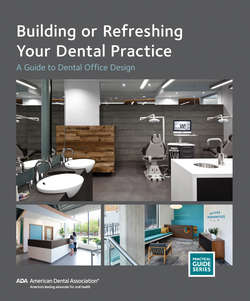Читать книгу Building or Refreshing Your Dental Practice - American Dental Association - Страница 9
На сайте Литреса книга снята с продажи.
Commercial Real Estate Agent/Broker
ОглавлениеTwo kinds of people can help you find your ideal dental office location: a commercial realtor and a dental office transition specialist (broker). It is crucial that they have dental experience and familiarity with local dental market conditions. You should also understand that they are compensated differently.
Two kinds of people can help you find your ideal dental office location: a commercial realtor and a dental office transition specialist (broker). It is crucial that they have dental experience and familiarity with local dental market conditions.
Commercial realtors earn money by receiving a “split commission” with the lessor or seller’s agent. You pay them nothing directly to help you find the space and negotiate a fair lease or purchase agreement. They have nothing to gain by steering you toward any specific property, because they get paid the same percentage no matter which space you prefer. (The exception to this rule is if they show you one of their listings.) The realtor approach gives you the widest range of choices and only one person to deal with. Commercial realtors only represent you, the buyer, while the lessor or seller has their own agent. Be sure any realtors you work with understand that you are only interested in viewing office space that meets the square footage requirements predetermined by you and your team. Also ask them to tell you if any of the properties they show you are one of their listings to prevent any perceived bias.
In contrast, dental office transition specialists (brokers) generally focus on selling existing dental offices. In some states they can represent both the buyer and the seller, although a buyer or seller may perceive this as a conflict of interest and prefer that his or her broker not represent the other party. They sign a contract with the seller, entitling them to be the only person who may “list” a property for sale, but only for a limited period of time, usually four months. If the property doesn’t sell, the seller can sign a new contract with a different broker and begin the process again. The broker is also instrumental in determining the office sale price.
In addition to representing prospective buyers and sellers of dental practices, brokers sign similar contracts with property owners who would like to lease or sell. Because of time constraints, a broker may focus on showing clients his or her listings first, rather than other properties for which he or she will be required to split a commission. If you are considering working with a broker, it is important to understand whom he or she will represent and the range of the listings that he or she will show you.
Occasionally the real estate agent or broker finds an interesting dental office space, but the developer’s agent, preferring to keep the entire commission, may insist on dealing with the dentist directly. Don’t do it alone! Many commercial realtors or brokers will still work for you behind the scenes for an hourly rate. They won’t get a split commission, but you will still get their expertise to secure the fairest lease or purchase agreement possible. Often the total hourly cost may be recouped less than six months into the lease or purchase agreement due to various concessions that your agent may secure.
Other important terms in your lease or purchase agreement may involve the following:
Signage
Tenant improvement allowances
A covenant of exclusivity
The lease term
Contractors with dental office experience from which to choose for tenant improvements
